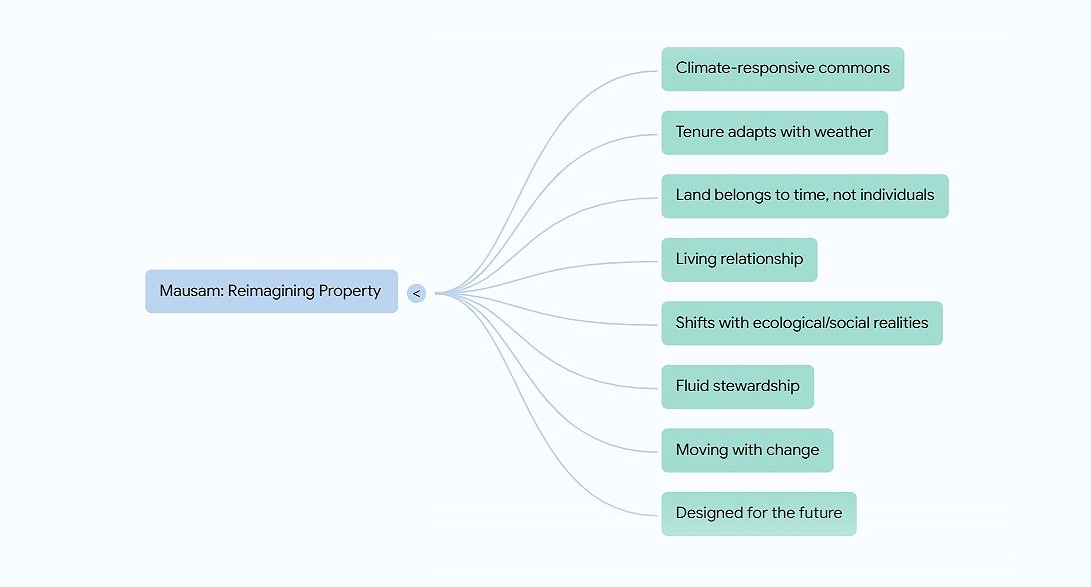Mausam: A Weathered Commons for a World in Motion
A provocation in reimagining land not as something to be owned, but as something that moves with the world around it.
In South Asia, land is not just geography. It is memory, migration, and motion. The monsoons arrive, rivers shift, coastlines dissolve, and with them, people move. Not by choice, but by necessity. Yet, property systems remain frozen in time, treating land as a fixed asset, an immovable possession, an extractable commodity.
Ownership, as we know it, is a fiction of permanence imposed upon a landscape that has never been still. But the land is already moving. The question is whether our laws will move with it.
A System That Was Never Meant for Us
For centuries, land in this region was governed by seasonal rhythms, ancestral stewardship, and negotiated commons. Then came colonial land codes, turning fluid relationships into rigid contracts, replacing shifting custodianship with permanent deeds. The land itself did not change. What changed was our ability to belong to it.
Now, with climate collapse accelerating, this fiction is cracking. Entire villages in the Sundarbans are sinking, their people becoming stateless in their own country. The Brahmaputra shifts its banks with every flood season, leaving thousands legally landless. In Rajasthan and Sindh, the desert creeps forward, turning farmland into dust. Across South Asia, families are being displaced without recognition, forced to migrate without rights, exiled from their own histories.
And yet, the laws remain still. They demand stability from a world that has none. They punish movement instead of protecting it. They refuse to adapt, as if refusing can stop the tide.
Mausam: The End of Fixed Borders, the Beginning of Fluid Stewardship
Mausam is not land reform. It is a re-imagination of property itself. It is a climate-responsive commons, where tenure adapts with the weather, where land does not belong to individuals but to time. Under Mausam, property is no longer a commodity to be owned, hoarded, or speculated upon. It is a living relationship that shifts with ecological and social realities.
In a world where the land no longer stays still, ownership cannot either. Instead, Mausam introduces a system where:
Rivershift Protocols ensure that when a river changes course, the right to land shifts with it, preventing entire communities from being erased overnight.
Tidal Tenure allows coastal populations to hold rotational rights, ensuring they are never permanently displaced by rising seas.
Cloud Villages create a system of multi-location residency, where those forced to move do not lose their legal status, but gain new ground.
A Living Land Ledger replaces static property deeds with an evolving registry that integrates Indigenous forecasting, AI climate modeling, and local stewardship practices.
Mausam is not about resisting change. It is about moving with it. It is a system designed not for the past, but for the future.
A Direct Challenge to Ownership
For too long, property has been a tool of exclusion. The wealthy buy land in places they will never live, while those who need it most are cast out. Real estate markets profit from disaster, pushing the displaced further to the margins, turning survival into a privilege only the few can afford. Mausam dismantles the speculative economy of land by making ownership dynamic, adaptive, and tied to use, not capital.
Under Mausam, land is no longer something you inherit, sell, or accumulate. It is something you hold in trust, for as long as you care for it. If you cultivate it, restore it and protect it. If not, it returns to the commons, waiting for the next steward. This is not a policy fix. This is a structural shift.
A Future Where Property Moves Like the Wind
Mausam does not ask, what happens when the land is lost? It asks, what if land could never be lost, but only reconfigured, reimagined, reassigned?
For generations, South Asia has lived by the rhythms of Mausam, a word that means season, weather, time itself. The land, the rivers, the tides, and the people, they have always moved together. Only the law has refused to change.
But that world is ending. The waters are rising. The earth is shifting. The climate is breaking. Mausam is not a question of possibility. It is a question of survival.
What would a world built on fluid stewardship look like? What would it take to get there? Let’s figure it out together.
We don’t have a neat answer. Maybe there isn’t one. But this is the kind of thing we want to keep picking at in Notes From In Between. If this idea makes you want to push back, add to it, or rethink it entirely, we want to hear from you.
If these notes resonate, we invite you to carry them forward with care in how they are critiqued, reimagined or cited. We see this as a way to amplify voices from the region, and to remind futures practice that no thought stands alone.
Suggested Citation: Kothari, D. (2025). Mausam: A Weathered Commons for a World in Motion. Notes From In Between, Lagori Collective.
Dhaval Kothari is a design researcher, strategist and co-founder of Lagori Collective. Lagori is an interdisciplinary research and design lab based in India working across South Asia. Grounded in research and participatory approaches, Lagori advances futures thinking through collaborative projects, research, programming, and strategic foresight. At its core, Lagori is building imagination infrastructure in the region by reshaping systems and expanding collective capacity, while ensuring that futures thinking is not abstract but rooted, situated, and durable.
Notes From In Between is a record of our in-progress thinking, provocations, open questions, and ongoing experiments at Lagori’s Social Design Lab. It’s where we make our process public — not to present answers, but to invite conversation.






Resonating with this, thanks for putting this out!
This is fascinating. So Mausam is a set of ideas/protocols?